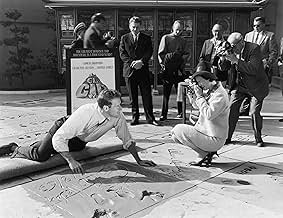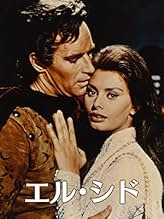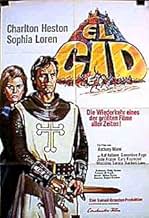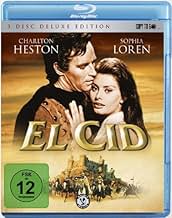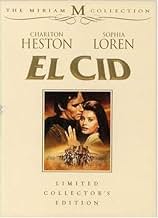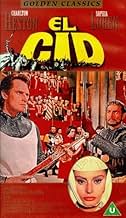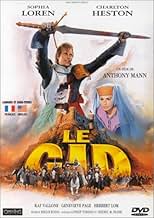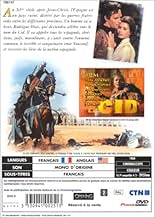CALIFICACIÓN DE IMDb
7.2/10
17 k
TU CALIFICACIÓN
El afamado héroe Rodrigo Díaz el Cid defiende a la España cristiana contra los moros.El afamado héroe Rodrigo Díaz el Cid defiende a la España cristiana contra los moros.El afamado héroe Rodrigo Díaz el Cid defiende a la España cristiana contra los moros.
- Dirección
- Guionistas
- Elenco
- Nominado a 3 premios Óscar
- 7 premios ganados y 13 nominaciones en total
Geneviève Page
- Princess Urraca
- (as Genevieve Page)
Gérard Tichy
- King Ramírez
- (as Gerard Tichy)
Opiniones destacadas
EL CID takes its place among the great screen epics that never allow the eye-popping spectacle to dwarf the human characters--just as "Ben-Hur" was able to do. And who else to play the legendary and noble Spanish hero than CHARLTON HESTON. He's magnificent here, playing his central role with an almost Shakespearean grandeur, as do some of the other cast members, including HERBERT LOM, JOHN FRASER and GARY RAYMOND.
So is the epic sweep of the tale and the intimate love story that begins when he is on his way to wed SOPHIA LOREN and finds himself asked to assume the mantle of leadership against the Moors in 11th century Spain. He makes the journey from peace-broker accused of treason to the King's fighting champion and later from exiled hero to legendary martyr.
Aside from the brilliant cinematography, authentic looking locales and colorful costumes, Miklos Rozsa's score adds a great deal to the intensely dramatic intimate scenes as well as the epic battles, all the while suggesting some Spanish motifs amidst the heraldic fanfares and love theme.
CHARLTON HESTON makes an impressive figure of El Cid, especially good in the final moments as the wounded leader who knows what he must ask his wife to do so that his followers do not lose heart after his death. RAF VALLONE as Count Ordonez, GENEVIEVE PAGE as Princess Urraca, JOHN FRASER as Prince Alfonso and GARY RAYMOND as Prince Sancho are all remarkable effective in strong supporting roles. In lesser roles, HURD HATFIELD and FRANK THRING bring their own brand of authority to minor parts.
Anthony Mann and his assistant directors have done an outstanding job on all of the battle scenes and he never falters in telling the tale in strong dramatic terms. There's an intensity in the scenes between Loren and Heston after he has been forced to kill her father for humiliating his own father in front of the court. Whatever friction there was between Heston and Loren on the set, works for them here because her animosity toward him is a chilling thing to watch.
The DVD has been wonderfully mastered and all of the Miklos Rozsa score sounds better than ever with Overture, Intermission and Exit music reminding us all what a treasure he was as a film composer.
So is the epic sweep of the tale and the intimate love story that begins when he is on his way to wed SOPHIA LOREN and finds himself asked to assume the mantle of leadership against the Moors in 11th century Spain. He makes the journey from peace-broker accused of treason to the King's fighting champion and later from exiled hero to legendary martyr.
Aside from the brilliant cinematography, authentic looking locales and colorful costumes, Miklos Rozsa's score adds a great deal to the intensely dramatic intimate scenes as well as the epic battles, all the while suggesting some Spanish motifs amidst the heraldic fanfares and love theme.
CHARLTON HESTON makes an impressive figure of El Cid, especially good in the final moments as the wounded leader who knows what he must ask his wife to do so that his followers do not lose heart after his death. RAF VALLONE as Count Ordonez, GENEVIEVE PAGE as Princess Urraca, JOHN FRASER as Prince Alfonso and GARY RAYMOND as Prince Sancho are all remarkable effective in strong supporting roles. In lesser roles, HURD HATFIELD and FRANK THRING bring their own brand of authority to minor parts.
Anthony Mann and his assistant directors have done an outstanding job on all of the battle scenes and he never falters in telling the tale in strong dramatic terms. There's an intensity in the scenes between Loren and Heston after he has been forced to kill her father for humiliating his own father in front of the court. Whatever friction there was between Heston and Loren on the set, works for them here because her animosity toward him is a chilling thing to watch.
The DVD has been wonderfully mastered and all of the Miklos Rozsa score sounds better than ever with Overture, Intermission and Exit music reminding us all what a treasure he was as a film composer.
I like my fair share of epics, Lawrence of Arabia, The Ten Commandments, Ben-Hur, all but to name a few. El Cid is one of the best epics I've seen, not the best, but it's up there. While long, it is always compelling with very rare a dull moment. The direction from Anthony Mann is excellent, and when it comes to the acting Charlton Heston is charismatic and powerful and Sophia Loren is stunning. That is not to forget Herbert Lom, Genvieve Page and Michael Hordern who among the great supporting cast are especially outstanding The characters are well-written and noble, and fully justified by one of the most literate scripts I feel ever in an epic. The story is also of exceptional quality, the cinematography and scenery are magnificent and Miklos Rosza's score is superlative. The action sequences also add to its sense of wonder, they are astonishing and the jousting scene is one of the best scenes in a film of this genre. Overall, an outstanding film and one of the best epics in my view. 10/10 Bethany Cox
As a movie El Cid grows on you. At first it is the story of a relatively ordinary man whose trip to his wedding is interrupted by a battle between the Moors and the Christians of 11th century Spain. But this is no ordinary man. Or perhaps he is an ordinary man who is destined to do extraordinary things. Early on he is forced to kill his fiancé's father as a matter of family honor, thus earning the enmity of his fiancé, who nonetheless cannot stop loving him, however hard she tries. And much of the story is devoted to the doomed nature of their love, as historical events continue to overtake the plans they would rather make. And with each new episode El Cid's stature grows, from warrior to hero to legend to mythic figure. Even in exile he has a following. And if the script is not true to history, this film still does a great service to the memory of a great man who put God and country ahead of himself. Something extra must be said about the crowd scenes. There were real people out there, not multiple CGI images made to look like the hordes that are a part of all epics. Over 30,000 costumes were made for this movie and General Franco donated the Spanish army to fill them. The difference is stunning, and sobering. There is a reality to the battle scenes that simply doesn't obtain in later movies such as Gladiator or Lord of the Rings. Now that old films such as this are so readily available in various formats we are presented with the dilemma of deciding which ones should occupy our bookshelves, to return to again, to remember a detail, or to reclaim the feeling that the story may create. In terms of the greatness, the mission and the struggles of the human spirit, this one's a keeper.
Grim, Ponderous, Moving, Magnificent
I'm a girl and have a girl's taste in movies. If I'm going to watch a movie with a lot of sword fights, oppressed peasants, and corrupt kings, I want it to be a swashbuckler, preferably one starring Errol Flynn. Swashbucklers bring a lot of humor to otherwise unbearable dramatic situations.
"El Cid" presents unbearable dramatic situations, and it is not a laugh riot. I saw the three-hour plus, uncut version and never felt tempted to laugh once. This is the Middle Ages without Monty Python, without the levity of an Errol Flynn - Olivia De Haviland romance or comic relief of a Little John.
Boy oh boy was this grim. And long. You could have almost filmed the entire film with three colors: white, black, and red. Lots of red.
But "El Cid" did to me what it wanted to do. I really believed in Rodrigo and Jimena as star-crossed, larger-than-life lovers. I really believed that the little girl who leads them from her well to her farm house lived a thousand years ago. I really believed that something like the mouth of hell itself was opening up as Ben Yusef invaded. I really believed in Rodrigo's relentless nobility and heroism. Neither Charlton Heston's strangely artificial looking hair nor the obvious non-Arab status of a couple of the "Moors" (Douglas Wilmer, who later played Sherlock Holmes, was one especially unconvincing Arab) interfered with my willing suspension of disbelief. I cried. Several times.
There's a lot to cry about. In almost every scene, someone is either crying, usually Sophia Loren, or gritting his teeth, often Charlton Heston, but others grit their teeth a lot, also. Actually Loren doesn't so much cry, but, rather, huge, luminous tears quiver, poised, on her lower eyelid. In her final scenes, the teardrop dancing on her right eyelid is so huge, black and luminous it begins to look like a second pupil.
If the sound of horse hoof-beats does something for you, you will love this movie. There are many horses. Many, many, many. And they are always thundering off to somewhere, more often than not, over cobblestones. Lots of horse hoof-beats on this soundtrack.
Some viewers found the plot hard to understand; they, perhaps, saw the cut version. Having seen the uncut version, I found the plot entirely comprehensible.
"El Cid" is like a ballad. There is one grim face-off after another, escalating in gravity, in which the hero proves that he is growing into his own heroism, through every choice he makes. Each choice is harder than the last one, until his final choice, which is truly impossible, but which he fulfills anyway. If you like medieval ballads, you may love this movie. It has the same grim beauty and power and inexorability, the same insistence on throwing whatever is divine in naked human character up against the impossible demands of earthly life.
For such a long movie, there is scant dialogue. With few words, people prove their true character through their actions, just as characters in ancient epics did.
One viewer complained that this movie bore no relation to the "real" El Cid legend. If that is true, the movie is all the more remarkable. The filmmakers managed to create, from scratch, a convincing and moving medieval narrative.
I'm a girl and have a girl's taste in movies. If I'm going to watch a movie with a lot of sword fights, oppressed peasants, and corrupt kings, I want it to be a swashbuckler, preferably one starring Errol Flynn. Swashbucklers bring a lot of humor to otherwise unbearable dramatic situations.
"El Cid" presents unbearable dramatic situations, and it is not a laugh riot. I saw the three-hour plus, uncut version and never felt tempted to laugh once. This is the Middle Ages without Monty Python, without the levity of an Errol Flynn - Olivia De Haviland romance or comic relief of a Little John.
Boy oh boy was this grim. And long. You could have almost filmed the entire film with three colors: white, black, and red. Lots of red.
But "El Cid" did to me what it wanted to do. I really believed in Rodrigo and Jimena as star-crossed, larger-than-life lovers. I really believed that the little girl who leads them from her well to her farm house lived a thousand years ago. I really believed that something like the mouth of hell itself was opening up as Ben Yusef invaded. I really believed in Rodrigo's relentless nobility and heroism. Neither Charlton Heston's strangely artificial looking hair nor the obvious non-Arab status of a couple of the "Moors" (Douglas Wilmer, who later played Sherlock Holmes, was one especially unconvincing Arab) interfered with my willing suspension of disbelief. I cried. Several times.
There's a lot to cry about. In almost every scene, someone is either crying, usually Sophia Loren, or gritting his teeth, often Charlton Heston, but others grit their teeth a lot, also. Actually Loren doesn't so much cry, but, rather, huge, luminous tears quiver, poised, on her lower eyelid. In her final scenes, the teardrop dancing on her right eyelid is so huge, black and luminous it begins to look like a second pupil.
If the sound of horse hoof-beats does something for you, you will love this movie. There are many horses. Many, many, many. And they are always thundering off to somewhere, more often than not, over cobblestones. Lots of horse hoof-beats on this soundtrack.
Some viewers found the plot hard to understand; they, perhaps, saw the cut version. Having seen the uncut version, I found the plot entirely comprehensible.
"El Cid" is like a ballad. There is one grim face-off after another, escalating in gravity, in which the hero proves that he is growing into his own heroism, through every choice he makes. Each choice is harder than the last one, until his final choice, which is truly impossible, but which he fulfills anyway. If you like medieval ballads, you may love this movie. It has the same grim beauty and power and inexorability, the same insistence on throwing whatever is divine in naked human character up against the impossible demands of earthly life.
For such a long movie, there is scant dialogue. With few words, people prove their true character through their actions, just as characters in ancient epics did.
One viewer complained that this movie bore no relation to the "real" El Cid legend. If that is true, the movie is all the more remarkable. The filmmakers managed to create, from scratch, a convincing and moving medieval narrative.
Aroused by a fanatical Moorish warlord, emir-king attack a Castilian village, where they are captured by Rodrigo Diaz de Vivar
Vigorously brave and compassionate, the noble Rodrigo hates bloodshed and vows to see his country at peace, frees the prisoners on their solemn pledge never again to attack Castile
For this act of courage and mercy, one of the Emirs, Moutamin, calls Rodrigo "El Cid," and pledges eternal friendship to the Cid of Vivar And so, in freeing the Moors, Rodrigo, accidentally, stumbled onto a battle, not to his luscious bride, but to a battle that will change his whole life
In the court of King Ferdinand, Rodrigo's act of clemency is misinterpreted, and he's accused of treason by his rival Don Ordonez for refusing to turn over to him the captures Moors
Unfortunately, Rodrigo's aged father, Don Diego, is slapped by the Champion of the king, Count Gormaz, father of his beloved Chimene Rodrigo begs Gormaz an apology; it is refused A duel begins and the champion is badly wounded Before he dies, however, he asks Chimene to avenge his death
Chimene's wish is fulfilled when King Ramiro of Aragon challenges King Ferdinand for the possession of the city of Calahorra by the outcome of a single combat El Cid convinces the king to permit him to fight Don Martin Thus, according to the custom of trial by combat, God would judge Rodrigo's guilt or innocence
"El Cid" is an intense film, lavish and spectacular, bigger than any in terms of cast and impressive as any in visual terms Miklós Rózsa gave a new dimension to the emotion that Anthony Mann was trying to express
Mann gives us a human story with a love story balanced with the most strongly image of a hero the world has ever seen He presented a man of honor who thinks always of his wife, his country, and his king first Even in death, his thoughts are for others and not himself
El Cid insults kings and noblemen in the name of justice and integrity and does what he knows to be right He battles the king's living sword in respect of his father He accepts the challenge of a champion of a king to prove himself innocent of treason and other things He shows a prince how any man can kill and only a king can give life He fights 13 knights, at the same time, to free a prisoner Yet he is in addition to all of this an extremely principled leader He accepts exile for life from the country he loves, and yet he is the only man in Spain who 'could humble a king and would give a leper to drink from his own pouch '
The joust sequence called "The fight for Calahorra," is perhaps the most rousing, exciting, one-to-one combat ever filmed The battle scenes at Valencia are taken on an epic scale But the value of Anthony Mann's movie is the characterization in which Charlton Heston played El Cid's life For this reason alone, the film is of greater value than most any other motion picture experience
Vigorously brave and compassionate, the noble Rodrigo hates bloodshed and vows to see his country at peace, frees the prisoners on their solemn pledge never again to attack Castile
For this act of courage and mercy, one of the Emirs, Moutamin, calls Rodrigo "El Cid," and pledges eternal friendship to the Cid of Vivar And so, in freeing the Moors, Rodrigo, accidentally, stumbled onto a battle, not to his luscious bride, but to a battle that will change his whole life
In the court of King Ferdinand, Rodrigo's act of clemency is misinterpreted, and he's accused of treason by his rival Don Ordonez for refusing to turn over to him the captures Moors
Unfortunately, Rodrigo's aged father, Don Diego, is slapped by the Champion of the king, Count Gormaz, father of his beloved Chimene Rodrigo begs Gormaz an apology; it is refused A duel begins and the champion is badly wounded Before he dies, however, he asks Chimene to avenge his death
Chimene's wish is fulfilled when King Ramiro of Aragon challenges King Ferdinand for the possession of the city of Calahorra by the outcome of a single combat El Cid convinces the king to permit him to fight Don Martin Thus, according to the custom of trial by combat, God would judge Rodrigo's guilt or innocence
"El Cid" is an intense film, lavish and spectacular, bigger than any in terms of cast and impressive as any in visual terms Miklós Rózsa gave a new dimension to the emotion that Anthony Mann was trying to express
Mann gives us a human story with a love story balanced with the most strongly image of a hero the world has ever seen He presented a man of honor who thinks always of his wife, his country, and his king first Even in death, his thoughts are for others and not himself
El Cid insults kings and noblemen in the name of justice and integrity and does what he knows to be right He battles the king's living sword in respect of his father He accepts the challenge of a champion of a king to prove himself innocent of treason and other things He shows a prince how any man can kill and only a king can give life He fights 13 knights, at the same time, to free a prisoner Yet he is in addition to all of this an extremely principled leader He accepts exile for life from the country he loves, and yet he is the only man in Spain who 'could humble a king and would give a leper to drink from his own pouch '
The joust sequence called "The fight for Calahorra," is perhaps the most rousing, exciting, one-to-one combat ever filmed The battle scenes at Valencia are taken on an epic scale But the value of Anthony Mann's movie is the characterization in which Charlton Heston played El Cid's life For this reason alone, the film is of greater value than most any other motion picture experience
¿Sabías que…?
- TriviaAccording to the legend of El Cid, in his youth Rodrigo came across a leper sinking in quicksand crying for help, but none of the bystanders dared touch him. Rodrigo pulled him from the bog, clothed him in his cloak, housed him in a barn, and went to get him some food. When he returned, he found the leper had transformed into an angelic figure that identified himself as St. Lazarus. He said "For your bravery and kindness, you will enjoy success as a warrior. You will win battles upon battles and never know defeat." In a nice nod to the legend, this movie contains a scene wherein the banished Rodrigo encounters a thirsty leper who begs a drink. After unhesitatingly offering his own pouch, the Leper thanks him by name. "Who are you?" asks Rodrigo. "I am called Lazarus", the leper answers. Then he crosses Rodrigo with his staff. "May helping hands be extended to you everywhere you go, my Cid."
- ErroresAlone and on horseback, Rodrigo confronts a group of mounted guards escorting the prince to a dungeon. In response to Rodrigo's demand for the release of the prisoner, the captain of the guard laughingly says, "There are thirteen of us, and you are alone!" In the ensuing fight, Rodrigo, with some help from the prince, unhorses sixteen guards, and two remaining mounted ones flee, for a total of eighteen.
- Versiones alternativas1993 reissue restores 16 minutes of "lost" footage.
- ConexionesEdited into Hechiceros (1977)
- Bandas sonorasThe Falcon and the Dove
(uncredited)
Lyrics by Paul Francis Webster
Music by Miklós Rózsa
Performed by Chorus
Selecciones populares
Inicia sesión para calificar y agrega a la lista de videos para obtener recomendaciones personalizadas
- How long is El Cid?Con tecnología de Alexa
Detalles
- Fecha de lanzamiento
- Países de origen
- Idiomas
- También se conoce como
- Ель Сід
- Locaciones de filmación
- Torrelobaton Castle, Valladolid, Castilla y León, España(for Vivar, El Cid's home town)
- Productoras
- Ver más créditos de la compañía en IMDbPro
Taquilla
- Presupuesto
- USD 6,250,000 (estimado)
- Tiempo de ejecución3 horas 2 minutos
Contribuir a esta página
Sugiere una edición o agrega el contenido que falta

Principales brechas de datos
What is the Canadian French language plot outline for El Cid (1961)?
Responda

